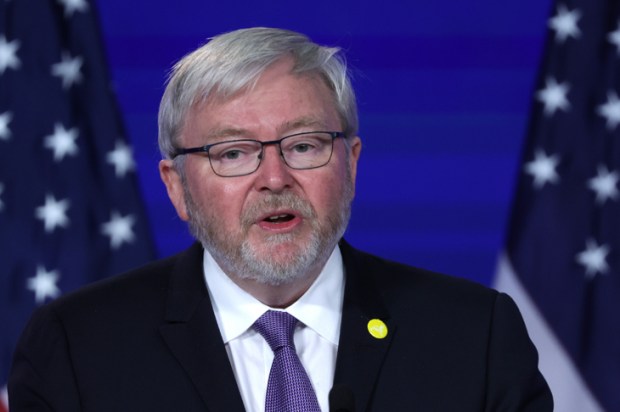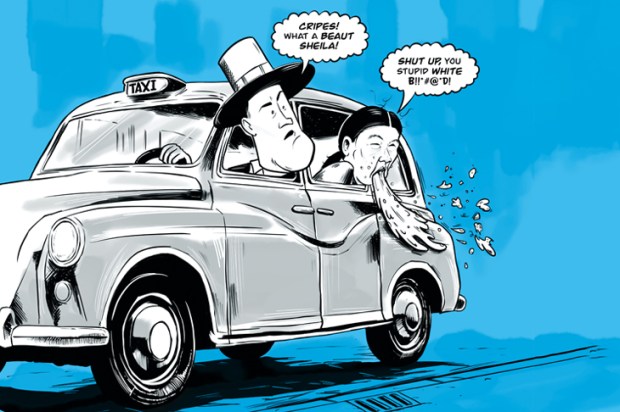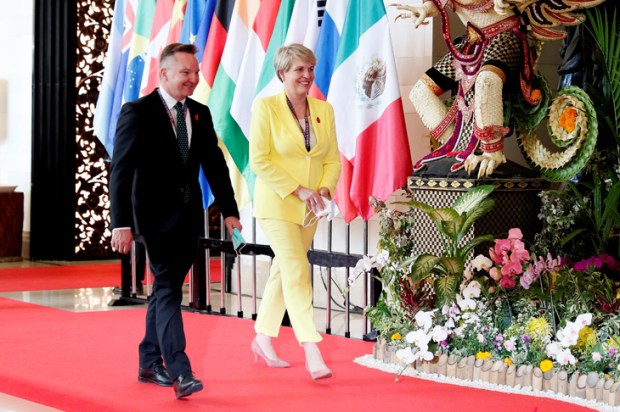They stabbed it with their steely knives, but they just can’t kill the beast,’ sang the Eagles in ‘Hotel California’. Perhaps they were talking about the Australian media, or perhaps not. Either way, the question remains: can you ever slay the bestial appetites of our relentless 24-7 news cycle?
In recent times, Labor has become mesmerised by both beast and steely knives; perversely determined to satisfy the bloodlust of the media by killing their own in unprecedented numbers. From Sussex Street to the ‘faceless men’, Labor has been self-destructively and slavishly addicted to the morning headlines. The media obsession has left not the beast, but the party itself a barely quivering corpse.
The genius of Tony Abbott is that rather than attempting to slay the creature, he has chosen to bore it senseless. Much like Crocodile Dundee and his hypnotic trick with an aggressive water buffalo, the new PM has chosen not to tackle the angry obstacle in his path head on, but rather to put it to sleep.
But can such a tactic continue to work? When Mr Abbott originally hinted at his strategy in the aftermath of the election, many were sceptical. Yet two months on, the strategy is clearly working. Despite the media’s rumbling tummy and baring of teeth, the ‘expenses scandal’ has largely disappeared, boats and boats stories have dried up and the economy and the NBN have found themselves relegated to the more obscure pages. The public? Relieved, we suspect.
Seasoned observers of Canberra are catching the significance of the strategy to discriminate in favour of steady and reliable processes over feeding the seemingly insatiable media cycle. Laurie Oakes, for example, has remarked: ‘This could be bad news for federal Labor, as it means the Coalition is laying firm foundations for long-term government.’
Kevin Rudd and Julia Gillard’s passion for headline-grabbing big announcements (‘Surprise!’) was ultimately counter-productive. To begin with, the perception of frantically setting the world to rights was a plus for both leaders, but as they repeatedly failed to implement these grandiose schemes the novelty wore off. Instead, the public found themselves on tenterhooks, anxiously wondering each morning what bizarre announcement to expect on the front page or the news bulletin.
The risk for the Coalition in avoiding the news cycle is that they are seen to be concealing the truth and avoiding accountability. This is the idea that the opposition are desperate to push, but thus far the public aren’t interested. Exhausted from six years of hyperactivity, there is genuine relief that politics is no longer a daily drama.
Can this strategy survive the return of parliament? It will be challenging, but so long as the electorate trusts that ministers are avoiding excessive exposure because they are competently getting on with their jobs, it should. For the opposition, alas, there can be no escape. As the Eagles might have put it regarding Labor’s addiction to the news cycle: ‘We are all just prisoners here, of our own device.’
Disinterested elites
One of the most intriguing moments of the United States Studies Centre’s Public Knowledge Forum held at the Sydney Opera House on 4 November came during the on-stage confrontation between US journalists Mary Kissel of the conservative Wall Street Journal editorial page and John Judis of the liberal New Republic. The subject? The role of ‘disinterested elites’.
Mr Judis suggested that America’s founding fathers, rather than trusting democracy to work, had desired to see an ‘objective’ elite made up of the political and media classes who would filter and where necessary overrule the wishes of the electorate in aid of ‘the greater good.’ Ms Kissel, who writes this week’s Diary, was appalled by the notion. Mr Judis talked with fondness of a golden era when an all-powerful ‘consensus’ media essentially told the elected members of Congress what they could and couldn’t do, often at the behest of various think tanks or ‘institutes’, wherein lay a superior wisdom to that of the masses.
Whether America’s founders had envisaged such an arrangement, as Mr Judis said, is a matter of conjecture. But one thing is clear: the concept has been adopted holus-bolus by the Left in Australia, who are driven to distraction by the thought that the people have actually elected the man they were clearly told by our own political/media elites was unelectable. Worse, Mr Abbott appears intent on passing legislation that is specifically contrary to the wishes of such elites. As Alexander Hamilton once said: ‘Here, sir, the people govern.’
Got something to add? Join the discussion and comment below.
Get 10 issues for just $10
Subscribe to The Spectator Australia today for the next 10 magazine issues, plus full online access, for just $10.
You might disagree with half of it, but you’ll enjoy reading all of it. Try your first month for free, then just $2 a week for the remainder of your first year.














Comments
Don't miss out
Join the conversation with other Spectator Australia readers. Subscribe to leave a comment.
SUBSCRIBEAlready a subscriber? Log in